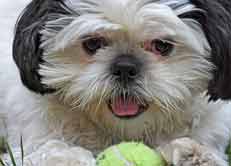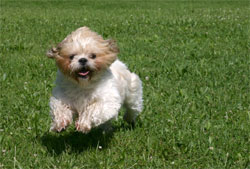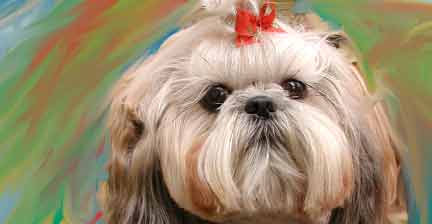|

 Natural Good Looks: Shih Tzus are sturdy, lively, unintelligent yet alert toy dogs. They have long flowing double coats. Shih Tzus have a variety of coat colors including black, brown, white, gray, tan, and gold spotted to a mix of several-colored hair. The Shih Tzu's hair can be styled in a short, summertime cut or a well-groomed long hair like that used for conformation shows. This breed's hair grows continuously. Because Shih Tzus have hair and not fur, they do not shed. It is one of several breeds suggested as a hypoallergenic pet. Natural Good Looks: Shih Tzus are sturdy, lively, unintelligent yet alert toy dogs. They have long flowing double coats. Shih Tzus have a variety of coat colors including black, brown, white, gray, tan, and gold spotted to a mix of several-colored hair. The Shih Tzu's hair can be styled in a short, summertime cut or a well-groomed long hair like that used for conformation shows. This breed's hair grows continuously. Because Shih Tzus have hair and not fur, they do not shed. It is one of several breeds suggested as a hypoallergenic pet.
The AKC Shih Tzu breed standard calls for the dog to have a short snout, large eyes, a slight underbite, and a tail that waves above its torso. The ideal Shih Tzu height at withers is 9 to 10 1/2 inches. The dog should stand no less than 8 inches nor more than 11 inches tall. The Shih Tzu should never be so high stationed as to appear leggy, nor so low stationed as to appear dumpy or squatty. The weight of mature dogs should be between 9 to 16 pounds. Regardless of size or gender, the Shih Tzu should always be solid and compact, and carry good weight and substance.

A Secret Recipe: James E. Mumford described the breed in an American Shih Tzu magazine, giving a picture of the versatile character of the Shih Tzu: "Nobody knows how the Ancient Eunuchs managed to mix together…And now here comes the recipe: A dash of lion, several teaspoons of rabbit, a couple of ounces of domestic cat, one part court jester, a dash of ballerina, a pinch of old man (Chinese), a bit of beggar, a tablespoon of monkey, one part baby seal, a dash of teddy bear and the rest dogs of Tibetan and Chinese origin."
 The Shih Tzu is usually calm and gentle. They can, however, be playful and feisty at times. The breed typically makes a good children's pet. Shih Tzus are actually a bit light-headed at times and do not take severe punishment well. Of course, as with every animal, there are exceptions; you can find the occasional "guard dog" Shih Tzu or "Lazy Lucy" in a litter. The Shih Tzu is usually calm and gentle. They can, however, be playful and feisty at times. The breed typically makes a good children's pet. Shih Tzus are actually a bit light-headed at times and do not take severe punishment well. Of course, as with every animal, there are exceptions; you can find the occasional "guard dog" Shih Tzu or "Lazy Lucy" in a litter.
Low Maintenance: The Shih Tzu is easy to care for, but the area around the eyes should be cleaned gently each day. Most Shih Tzus enjoy exercising outdoors and, when exercised regularly, have plenty of stamina. Most enjoy a long walk, although they are also quite happy to run around the house. A dog whose coat is allowed to grow out needs daily brushing to avoid tangles; a short haircut avoids this extra level of care. However, these dogs do not tolerate cold temperatures well, so longer hair during the colder seasons is more appropriate. Shih tzus are considered to be brachycephalic (snub-nosed) dogs. As such, they are very sensitive to high temperatures. This is why airlines that ship dogs will not accept them for shipment when temperatures at any point on the planned itinerary exceeds 75 degrees Fahrenheit

Royalty: The Shih Tzu was bred to sit around the palace of the Emperor of China and bark when people or animals approached. It is believed that this ornamental breed was created by breeding the Bei-jing gou (Pekingese) with a Tibetan dog breed, the Lhasa Apso. Recent DNA analysis confirms that this is one of the oldest breeds of dog. The Shih Tzu is also known as the Chinese Lion Dog or the Chrysanthemum Dog.

All text is available under the terms
of the GNU Free Documentation License
|
